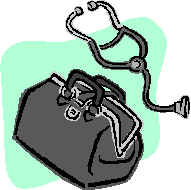There are many factors that have contributed to the massive healthcare expenditures in the US today. Costs of technology, costs of hospitalizations and hospital based services, physician fees, drug costs and costs of litigation (see tort reform and how Senator John Edwards made his fortunes) are all major factors that drive the cost of care higher.
There are many factors that have contributed to the massive healthcare expenditures in the US today. Costs of technology, costs of hospitalizations and hospital based services, physician fees, drug costs and costs of litigation (see tort reform and how Senator John Edwards made his fortunes) are all major factors that drive the cost of care higher. To be effective, healthcare reform must address ALL of these aspects equally–regulation and cost containment must be applied to each of these entities in order to successfully lower cost while maintaining quality care. One area that does not receive enough attention in healthcare reform discussions is that of drug costs. In 2010, Americans spent nearly 262 billion dollars on prescription drugs. Since the beginning of the new affordable care act (ACA) Americans have only saved a modest 3.7 billion in prescription drug costs. I argue that this is not nearly enough. Many new biologics and so called designer drug therapies are being produced at enormous expense. Many of these therapies have not been shown to significantly impact disease survival. However, they do often provide hope for patients left with few options.
Yesterday in the New York Times, I read another wonderful article by cancer patient Dr Susan Gubar. Once again, Dr Gubar inspires with her words. In her blog, Dr Gubar discusses the expense and frustration associated with drug therapy. Often availability and production become an issue for desperate patients. Costs prohibit access to new therapies for many. As Dr Gubar points out, it is often the most vulnerable that are harmed by drug shortages and outrageous costs–kids with leukemia, and the elderly. Our system of drug development and marketing has been entrusted to businessmen and women who are held more accountable by Wall Street investors than by the patients they serve. This is not to say that pharmaceutical executives do not care about the patients that their drugs impact–however, they do care a great deal about PROFIT. A good example of this was revealed in a pre reform New York TImes article from 2009. In this article author Duff Wilson reports on the pharmaceutical industry’s practice of raising drug prices in advance of healthcare reform legislation. The drug makers raised prices over 9% in a move to limit their profit reduction when potential federal mandates arrive that force them to lower prices. In effect, the industry has attempted to set up a higher price base prior to the inevitable reductions that will come with reform. In essence they are hoping for a net zero change–certainly these types of strategies will limit any reform’s ability to contain costs. This is just plain wrong and is reminiscent of the price gouging that is seen after natural disasters such as Hurricane Katrina.
Healthcare reform is here. How it is implemented remains up for some debate. To be successful we must address all factors that are driving up the cost of care. Drug makers must be held accountable to the Americans who depend on their therapies. Pharmaceutical cost must be regulated and the cost of new biologics must be weighed against their effectiveness. There is no debate that outcomes data has to be a part of this type of decision making process. Patients depend on a constant and reliable supply of certain drugs. We must hold drug makers accountable for shortages–we must shift the pharmaceutical executives focus from making expensive, new designer drugs to providing quality service and a reliable supply at a fair cost. Do I have an answer for this? Most assuredly I do not. However, we must all come together–physicians, politicians, pharmaceutical and other industry executives as well as patients to find some common ground. It is only thru cooperation and compromise that the real healthcare reform in the US will come to fruition.








